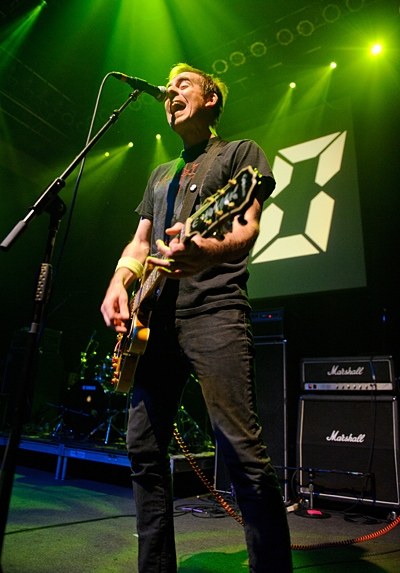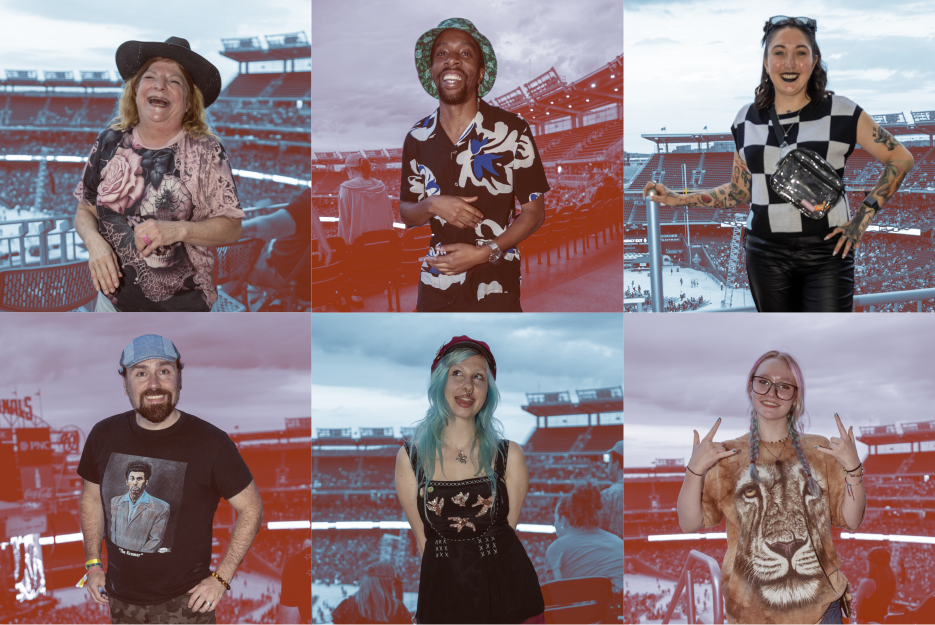
In 1999, after the breakup of his Notre Dame college band, Chisel, and stints with the Spinanes and the Sin-Eaters, then-DC-based Ted Leo embarked on his first solo effort with the album tej leo(?), Rx/pharmacists. Though Leo wouldn’t turn the Pharmacists into a full-fledged band for another year, the record marks the beginning of what has now been a 12-year run for the punk rock lifer—and he’s not slowing down anytime soon. Leo released one of his tightest and fieriest records to date in 2010’s Brutalist Bricks, at one point somehow rhyming “There was a resolution pending on the United Nations floor” with “In reference to the question ‘What’s a peacekeeping force for?’”
Leo, never wary of injecting a little political discourse into his music, returns to DC this Saturday with his Pharmacists to play a benefit concert for immigrant rights, union organizing, and community building at the Sacred Heart Church in Columbia Heights. The show, coordinated by punk activist organization Positive Force DC, will also feature local DIY punk act the Max Levine Ensemble and Dischord Record’s Medications. Tickets are $10 with a can of food or $12 without, and all profits benefit the National Day Laborer Organizing Network and We Are Family DC. In advance of the show, we talked with Leo about his undying love for Twitter, the local music scene, and belting out punk anthems in churches.
At last year’s SXSW you pulled double duty, playing with the Pharmacists and interviewing bands for Independent Film Channel. How was it being on the other side of the microphone?
I was extremely nervous at first, but I think I settled in as the week went on, and found both the confidence you need to feel like you can engage interestingly with someone you’ve never spoken to before, and how to fit myself and my own conversational style into the process.
If playing music didn’t work out, do you think you would’ve ever considered getting into music journalism?
Mmm, probably not.
It seems increasingly that if you want to have a career in music these days, you have to be pretty creative with how you manage your time. On top of making music and, in a lot of cases, working a day job, there are a handful of social media platforms that have to be managed and updated. Do you think social media has been a burden or boon for bands?
I can’t speak for anyone but myself, but there are aspects of it that I find energizing and fun and helpful, and that would definitely put it in the boon category for me; but there are probably more, if I’m being completely honest, that tilt it toward burden. I maintain Facebook and Myspace accounts, but they’re practically ghost accounts at this point. I can’t keep up, and I ran screaming from my personal accounts on both those services. I like e-mail, I like Web sites or blogs, and I love Twitter.
You’ve got a large and very dedicated following on Twitter. How has that open dialogue changed your relationship with your fans?
I don’t think it’s really changed much. I look at it as just another way to keep a conversation going with people at all different relationship levels. In some ways, it’s like stage banter or quick conversations at a club. In other ways, it can lead to something deeper in another medium, or it can just be quick asides and short connects with people I’m somewhat closer with. It can also just be a brief window into my thought process or personality that gets shot out there to no one in particular and can be engaged with or left alone by anyone who happens to see it.
A couple of months back, I came across a scan of your old DC driver’s license on Twitter. How long did you live in DC for? What was your time like here?
I was in DC for about five years total, in a couple of different stints. To say what my time was like here—I don’t think I’d have enough time!
People often comment that because DC is such a transient city, it’s difficult to maintain an active local music scene. Do you think that’s true? Did you feel like part of a community when you were forming the Pharmacists?
Well, that may be true as it relates to government or students, but the music scene here has always been rooted in people who grew up in this town, a pretty large percentage of whom have made conscious decisions to stay here because of their love for it. When I moved to DC, I had acquaintances from the broader touring music scene, but I loved it here. I went very local very fast and did, indeed, feel very much a part of a community. It’s what keeps me attached to DC to this day, despite the fact that it’s been a decade since I’ve lived here.
What’s the best record you’ve been introduced to this year (new or old)?
That’s tough, but I’ll tell you this: We did most of this tour with a band from Nashville called Pujol—their lead singer/songwriter’s name is Daniel Pujol—and their new album, Nasty, Brutish, and Short, has some amazing power-pop-punk fuzz nuggets on it that I can’t stop listening to. Two songs, specifically: “Mayday” and especially “Tiny Gods.”
You have a rich history of covers, ranging from artists like Curtis Mayfield and Blondie to Big Star and Kelly Clarkson. What inspires a cover? Is that just how you react to a great song?
Exactly. It’s just connecting with something on a level that makes me want to sing or play it so much that I want to share it.
Your record The Brutalist Bricks is particularly vigorous, like you’d been freshly rejuvenated. What keeps you motivated and playing at such a high level of creativity and energy? Coffee? Drugs?
Not much coffee, not really any drugs other than generic Excedrin migraine. At the risk of sounding too cheesy, I just love making music. I love making the music I make, and I care about addressing things that are important to me within that music, and that requires that level of energy to be adequately expressed.
Speaking of coffee, is there a followup to The Brutalist Bricks brewing?
Yes, but I only know what about half of that brew is, currently. There’s some deeper bubbling that I have to let percolate, to belabor the metaphor.
Positive Force, which has put together your show at Sacred Heart on Saturday, obviously tries to fight that attitude and bring the community together through music. Have you worked with the organization before?
Yeah, from time to time, but this is the first straight-up benefit we’ve done in a while. [Positive Force cofounder] Mark Andersen and I have been discussing it for a few years, actually, and finally everything came together.
How do you feel about rocking out in a house of worship? Does the venue ever affect the way you perform?
Churches that have a history of supporting punk shows are obviously churches that are open to at least fostering discussion among their populace and respecting divergent thought. It’s in that spirit that I approach playing a church. Usually [we perform] in the basement or the meeting hall or whatever, so it doesn’t require a change in how you perform, but I’ve both played and seen some amazing shows in church sanctuaries that benefit from working with the atmosphere and acoustics, and can be pretty magical.
The crowd itself must be very different, going from a club with a full bar to a more DIY venue with a water cooler. Does that alter the way an audience responds to the music?
Well, generally, I think even our chattiest drinking crowds are actually interested in the music. We’ve never had the blessing/curse of being a buzz band that brings people out just to go out, so I don’t think the difference will be insane. But there will probably be a little less chatting, I’d imagine.
Ted Leo and the Pharmacists play the Sacred Heart Church in Columbia Heights this Saturday, November 12, to benefit the National Day Laborer Organizing Network and We Are Family DC. Tickets ($12) are available through Positive Force’s Web site.















